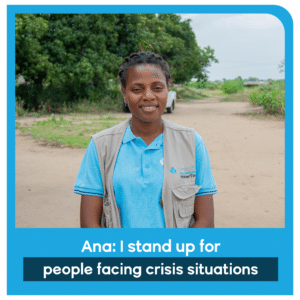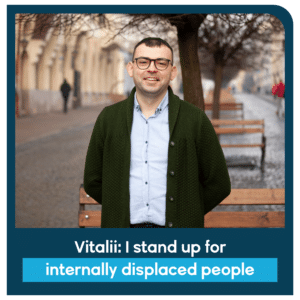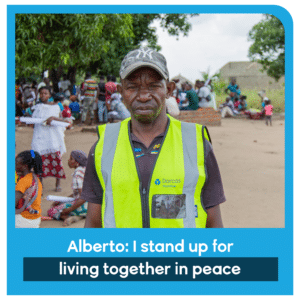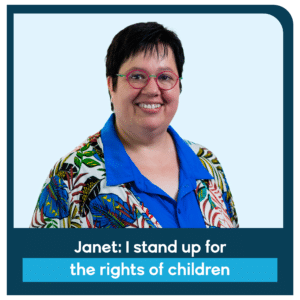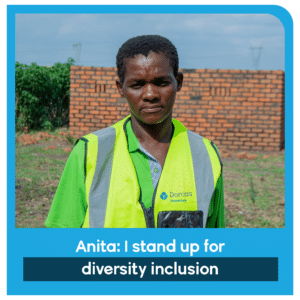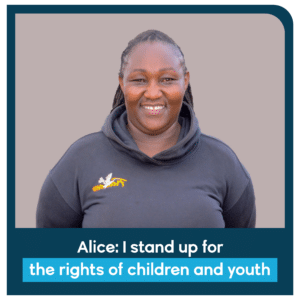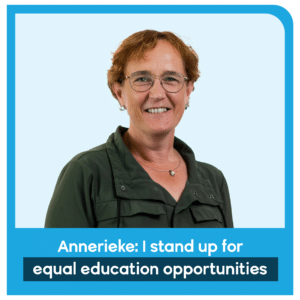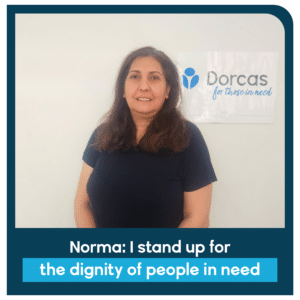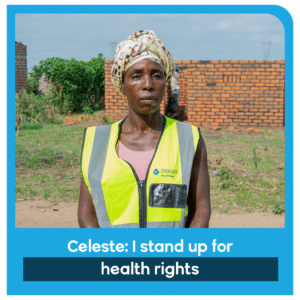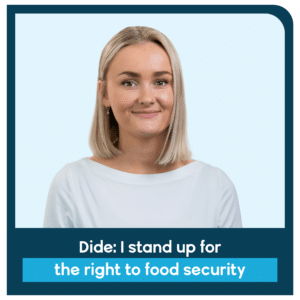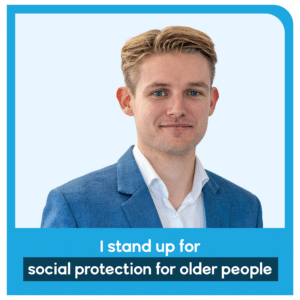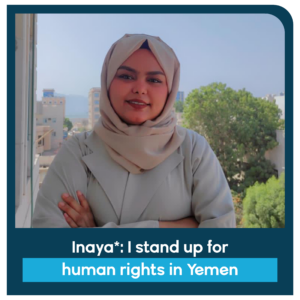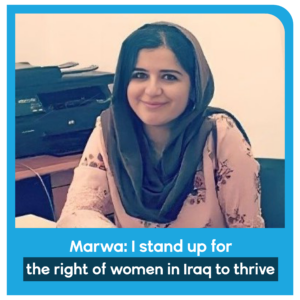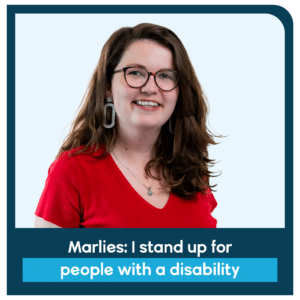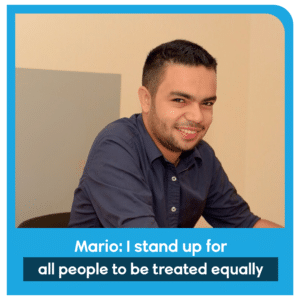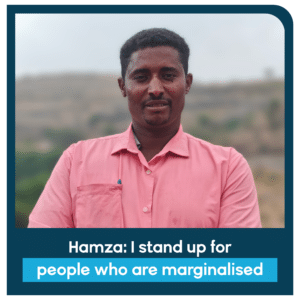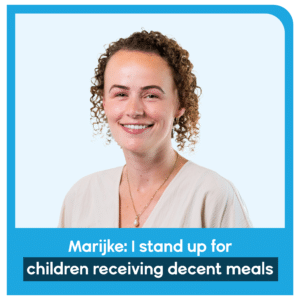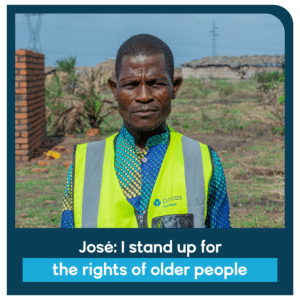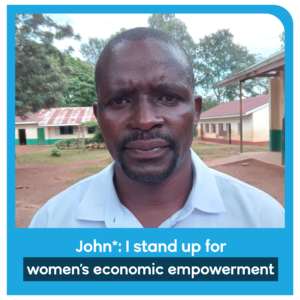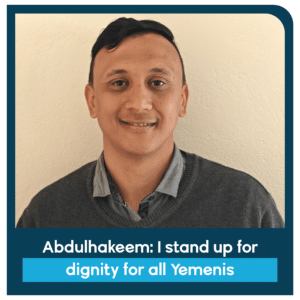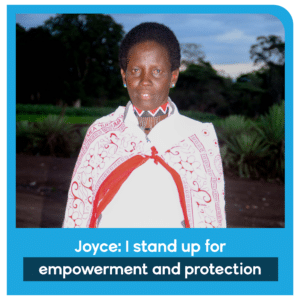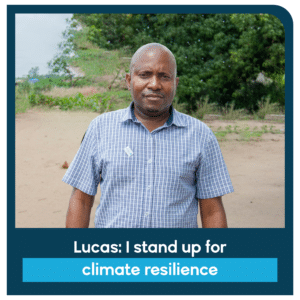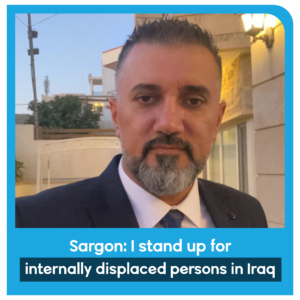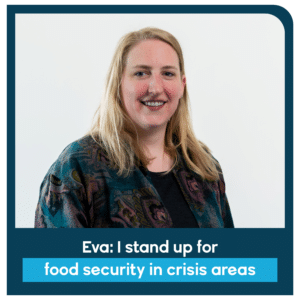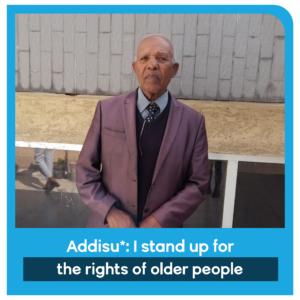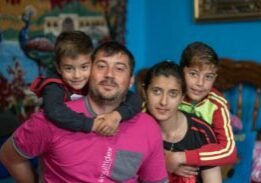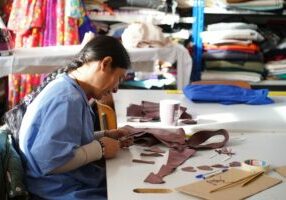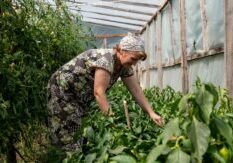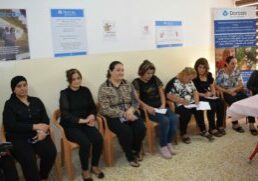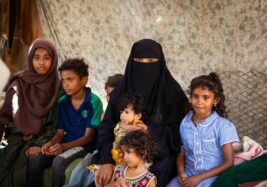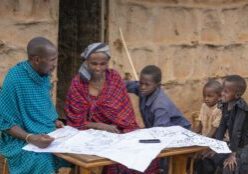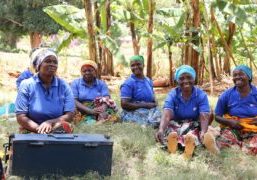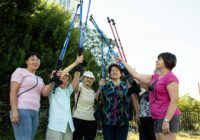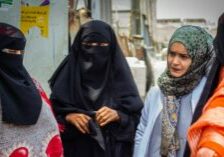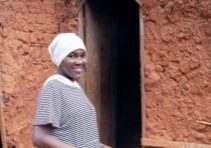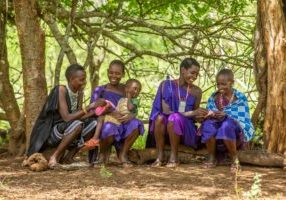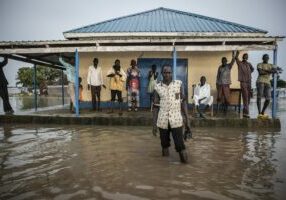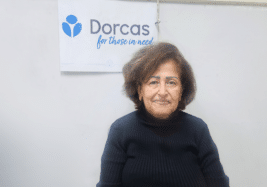Contributing to a just society
Seventy-five years ago, the United Nations General Assembly adopted the Universal Declaration of Human Rights. This landmark document enshrines the rights of all human beings, and its impact and ongoing influence will be celebrated on 10 December 2023: Human Rights Day.
Human rights are intricately woven into what Dorcas is and does. In a rapidly changing world, we see many marginalised and vulnerable people in need whose voices often go unheard. We meet their needs, but we also work hard for their participation in a just and fair society where everybody is included. We stand up for safety, dignity and the right to contribute. We stand up for human rights for all!
We highlight stories of various stakeholders that stand up for human rights. All in their own way, as every contribution matters in the mission to safeguard these rights.
Agnes: 'We stand up for human rights'
Agnes is the Chief Executive Officer of Dorcas.
Agnes: ‘Human rights and inclusion are woven into the fabric of what Dorcas is and does. In practice, this means we strive for a society in which equality, well-being, freedom and protection are promoted, especially for people who are excluded. Therefore, our work focuses on marginalised groups, in particular older people, people with disabilities, women and children and ethnic groups such as Roma. We enable them to develop their talents and create opportunities for them and their communities to become more resilient, address their problems and flourish.'
How does Dorcas stand up for human rights?
Cor: ‘I stand up for people affected by the consequences of climate change'
Cor is a former Programme Manager and Country Director at Dorcas.
‘South Sudan is not only plagued by conflicts. It is also prone to flooding due to its relatively low elevation. The country lacks the infrastructure to contain floodwaters, so the rivers overflow and inundate the land. Climate change has worsened this problem because the rainfall is now more frequent and intense. In the Netherlands, we use dikes to contain water, so why not do the same in South Sudan? With that thought in mind, we initiated a project in collaboration with ZOA to build dikes.'
Gilberte: 'I stand up for the right to safety'
Gilberte is a project participant of Dorcas Lebanon.
Gilberte: ‘I stand up for safety because the situation in Lebanon is very insecure. I currently live alone and have no contact with my family due to a family conflict. This made me realise how much I need the support of others in the struggles I face and to be surrounded by people who care for me.'
Lyudmila: 'I stand up for mental health protection'
Lyudmila is project participant of Dorcas Ukraine.
Lyudmila: ‘The death of my husband became a moral and emotional test for me. I kept all the sadness and grief inside me. Only after a visit to a psychologist was I able to let go of my emotions and focus on the bright moments of my life. Therefore, I stand up for the right to mental health protection.
Now, I realise why I live on. I am waiting for peace to come to my country and my grandson.’
Rachelle: 'I stand up for women's right to safety'
Rachelle is a Shelter Manager at Dorcas Lebanon.
Rachelle: ‘Empowerment and safety go hand in hand. By fostering a society that values and respects women's safety, we create an environment where every woman can thrive and reach her full potential.'
Florencio: ‘I stand up for access to clean water’
Florencio is the Country Director of Dorcas Mozambique.
Florencio: 'I stand up for the human right of dignified access to clean and adequate water, sanitation and hygiene. This issue is important to me because over half the population in Mozambique (14.8 million people) doesn't have access to clean water, even though water is crucial for good health. Water, sanitation and hygiene is one of our three strategic pillars, and we aim to strengthen this human right in Mozambique through our programmes.
Ioana: ‘I stand up for the rights of Roma women’
Ioana is a project participant of Dorcas Romania.
Ioana: ‘I stand up for the rights of Roma women to an education and a decent job. When I was 18 months old, my left hand was severely burned in an accident. As a result of this disability, my parents never sent me to school. So, I did not learn to read or write or acquire some of the skills you need to get a job.'
Ioana: ‘I stand up for Roma children’s right to education’
Ioana is the co-founder and director of ASA Association, an implementing partner of Dorcas.
Ioana: ‘For many Roma, the cycle of prejudice and exclusion starts when they are young. Roma children experience social marginalisation and segregation from the outset of their educational journey.’
Abdulhakeem: ‘I stand up for a life of dignity for all Yemenis’
Abdulhakeem is a Humanitarian Programme Manager at the International Training and Development Center (ITDC) in Yemen. ITDC is a partner of Dorcas Yemen.
Abdulhakeem: ‘I stand up for a life of dignity for all Yemenis, because over the last decade, many Yemeni people were robbed of the right to live in dignity. They suffered from displacement, marginalisation, and persecution of all kinds. I hope to wake up one day to a Yemen where all people are treated with dignity.’
Jennifer: ‘I stand up for access to education for all children’
Jennifer is a Social Worker in a community centre of Dorcas Lebanon. Through these centres, Dorcas provides an essential combination of practical care and psychosocial support to the refugee and host population – especially women and children - to stimulate joint recovery and rebuild the social fabric.
Jennifer: ‘Education is much more than a basic human right. It is the birthright of every child, the key to the future and the foundation of an equitable society.’
Marah: ‘I stand up for the dignity of refugees’
Marah is a student and a project participant of Dorcas Lebanon.
Marah: ‘As a Syrian refugee, in my community, it is hard to express my opinions and thoughts. I want people to know that Syrian refugees did not choose to be refugees and leave their country and community. I believe we need to work towards more social cohesion in our society. It would be beneficial to have more community centres create safe spaces for people from different backgrounds to meet and overcome social barriers.’
Peter: 'I stand up for the dreams of farmers'
Peter is a Social Empowerment and Protection Expert at Dorcas.
Peter: 'Central to the PIP approach is the development of an Integrated Farm Plan by all members of the household. Together, they make a drawing of the desired future situation which serves as a basis to take concrete actions to reach their dream. Since it is their own plan, they are very motivated to achieve it!'
Minsa*: ‘I stand up for the right to proper work‘
Minsa (32) is a project participant of Dorcas partner Loyac in Yemen.
Minsa fled with her husband and their five children to Aden from an escalated conflict and bombings in Yemen. They experienced a lot of stress and trauma and had no means to support themselves.
Minsa: ‘Dorcas gave us the psychosocial support we needed and through an empowerment programme, we could set up a business and support ourselves as a family.'
Rosy: 'I stand up for people's rights in decision making'
Rosy is a Protection Specialist at Dorcas Lebanon.
Rosy: ‘I recognise and advocate for individuals’ rights to express their opinions and actively participate in society. Empowerment and inclusion are crucial for everyone to engage in various aspects of community life, including social, cultural, and economic spheres. By promoting empowerment and inclusion, we can create more just and inclusive societies.’
Adia*: 'I stand up for the rights of women'
Adia is a Project Officer at Dorcas Ethiopia.
Adia: ‘I believe everyone should advocate for women’s empowerment because, in most countries, women carry many responsibilities for their families and communities. Programmes that are leaving behind women are ineffective. In my work, I assist women in developing self-confidence and promoting their right to influence social change for themselves and others. I also support them in participating in decision-making, securing a place of work, and upgrading their knowledge by facilitating training for them.’
Annerieke: 'I stand up for equal training opportunities for all'
Annerieke is International HR Advisor at Dorcas.
Annerieke: 'Learning allows you to grow as a person and as a professional. That is why we work on a good (online) learning environment and create time and space for our colleagues to take a course. It is important that everyone gets the opportunity to participate. That is why we provide courses in different languages and for all positions within the organisation.'
News
*Not his/her real name. At the participants request, we have used a pseudonym for this contribution.
